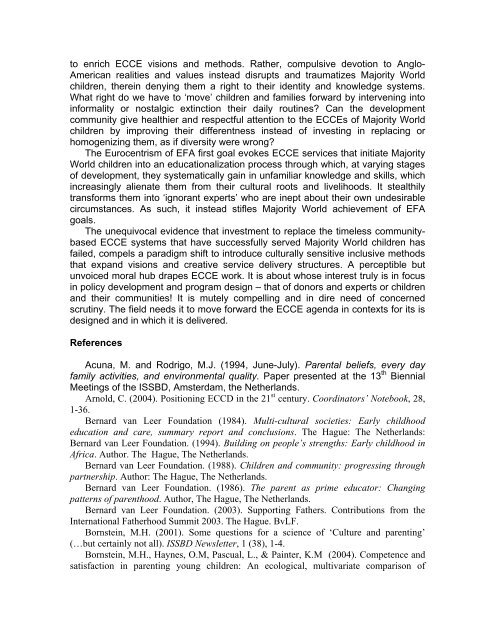Cultures in Early Childhood Care and Education - Consultative ...
Cultures in Early Childhood Care and Education - Consultative ...
Cultures in Early Childhood Care and Education - Consultative ...
You also want an ePaper? Increase the reach of your titles
YUMPU automatically turns print PDFs into web optimized ePapers that Google loves.
to enrich ECCE visions <strong>and</strong> methods. Rather, compulsive devotion to Anglo-<br />
American realities <strong>and</strong> values <strong>in</strong>stead disrupts <strong>and</strong> traumatizes Majority World<br />
children, there<strong>in</strong> deny<strong>in</strong>g them a right to their identity <strong>and</strong> knowledge systems.<br />
What right do we have to ‘move’ children <strong>and</strong> families forward by <strong>in</strong>terven<strong>in</strong>g <strong>in</strong>to<br />
<strong>in</strong>formality or nostalgic ext<strong>in</strong>ction their daily rout<strong>in</strong>es? Can the development<br />
community give healthier <strong>and</strong> respectful attention to the ECCEs of Majority World<br />
children by improv<strong>in</strong>g their differentness <strong>in</strong>stead of <strong>in</strong>vest<strong>in</strong>g <strong>in</strong> replac<strong>in</strong>g or<br />
homogeniz<strong>in</strong>g them, as if diversity were wrong?<br />
The Eurocentrism of EFA first goal evokes ECCE services that <strong>in</strong>itiate Majority<br />
World children <strong>in</strong>to an educationalization process through which, at vary<strong>in</strong>g stages<br />
of development, they systematically ga<strong>in</strong> <strong>in</strong> unfamiliar knowledge <strong>and</strong> skills, which<br />
<strong>in</strong>creas<strong>in</strong>gly alienate them from their cultural roots <strong>and</strong> livelihoods. It stealthily<br />
transforms them <strong>in</strong>to ‘ignorant experts’ who are <strong>in</strong>ept about their own undesirable<br />
circumstances. As such, it <strong>in</strong>stead stifles Majority World achievement of EFA<br />
goals.<br />
The unequivocal evidence that <strong>in</strong>vestment to replace the timeless communitybased<br />
ECCE systems that have successfully served Majority World children has<br />
failed, compels a paradigm shift to <strong>in</strong>troduce culturally sensitive <strong>in</strong>clusive methods<br />
that exp<strong>and</strong> visions <strong>and</strong> creative service delivery structures. A perceptible but<br />
unvoiced moral hub drapes ECCE work. It is about whose <strong>in</strong>terest truly is <strong>in</strong> focus<br />
<strong>in</strong> policy development <strong>and</strong> program design – that of donors <strong>and</strong> experts or children<br />
<strong>and</strong> their communities! It is mutely compell<strong>in</strong>g <strong>and</strong> <strong>in</strong> dire need of concerned<br />
scrut<strong>in</strong>y. The field needs it to move forward the ECCE agenda <strong>in</strong> contexts for its is<br />
designed <strong>and</strong> <strong>in</strong> which it is delivered.<br />
References<br />
Acuna, M. <strong>and</strong> Rodrigo, M.J. (1994, June-July). Parental beliefs, every day<br />
family activities, <strong>and</strong> environmental quality. Paper presented at the 13 th Biennial<br />
Meet<strong>in</strong>gs of the ISSBD, Amsterdam, the Netherl<strong>and</strong>s.<br />
Arnold, C. (2004). Position<strong>in</strong>g ECCD <strong>in</strong> the 21 st century. Coord<strong>in</strong>ators’ Notebook, 28,<br />
1-36.<br />
Bernard van Leer Foundation (1984). Multi-cultural societies: <strong>Early</strong> childhood<br />
education <strong>and</strong> care, summary report <strong>and</strong> conclusions. The Hague: The Netherl<strong>and</strong>s:<br />
Bernard van Leer Foundation. (1994). Build<strong>in</strong>g on people’s strengths: <strong>Early</strong> childhood <strong>in</strong><br />
Africa. Author. The Hague, The Netherl<strong>and</strong>s.<br />
Bernard van Leer Foundation. (1988). Children <strong>and</strong> community: progress<strong>in</strong>g through<br />
partnership. Author: The Hague, The Netherl<strong>and</strong>s.<br />
Bernard van Leer Foundation. (1986). The parent as prime educator: Chang<strong>in</strong>g<br />
patterns of parenthood. Author, The Hague, The Netherl<strong>and</strong>s.<br />
Bernard van Leer Foundation. (2003). Support<strong>in</strong>g Fathers. Contributions from the<br />
International Fatherhood Summit 2003. The Hague. BvLF.<br />
Bornste<strong>in</strong>, M.H. (2001). Some questions for a science of ‘Culture <strong>and</strong> parent<strong>in</strong>g’<br />
(…but certa<strong>in</strong>ly not all). ISSBD Newsletter, 1 (38), 1-4.<br />
Bornste<strong>in</strong>, M.H., Haynes, O.M, Pascual, L., & Pa<strong>in</strong>ter, K.M (2004). Competence <strong>and</strong><br />
satisfaction <strong>in</strong> parent<strong>in</strong>g young children: An ecological, multivariate comparison of
















